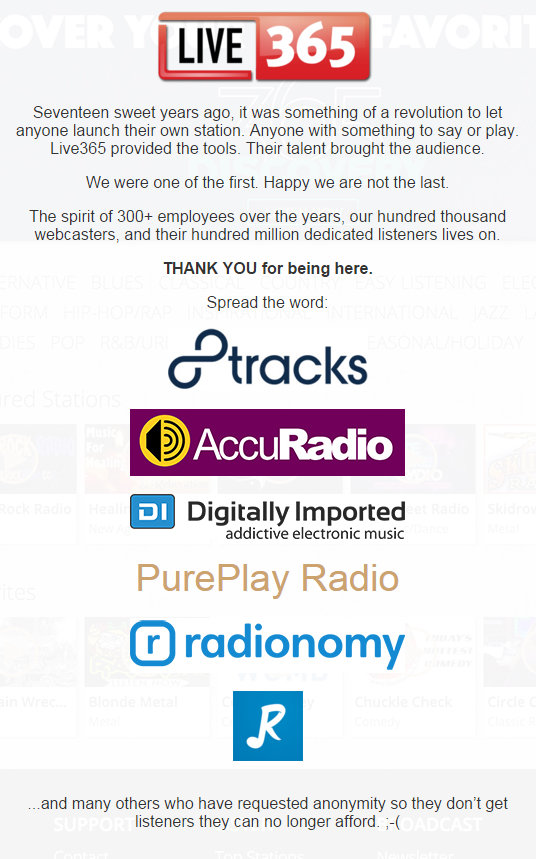As of February 1, 2016, the Internet radio pioneer Live365 has closed shop.
I imagine many SWLing Post readers are familiar with Live365, especially if you have a WiFi radio with the Live365 app.
While I’ve never been an avid listener of Live365, I have certainly enjoyed a wide variety of independent Internet radio stations via the platform.
Why did Live365 close shop? Here’s what Forbes.com suggests:
“It is rumored that the service is being forced into early retirement because of new royalty rates that digital radio producers now need to adhere to. Late in 2015, the Copyright Royalty Board handed down its decision about what internet radio services will need to pay per stream, and it apparently hurt Live365 so much that it can no longer afford for the rights to play music. Companies like Pandora lobbied hard for the court to lower royalty rates for the next five years, and while certain kinds of streams will cost internet radio stations and services less, it will cost platforms more overall to continue to play music. This may not be the only reason why Live365 is going out of business, but it appears to have been a factor.”
I’m sure the new royalty rates had had a major influence on the decision to close down. Here’s a screen capture of the parting message from Live365’s web site:
That is the conundrum of Internet streaming services: the more listeners, the more it costs to broadcast due to both bandwidth and royalties. Your success–especially when the music industry moves toward higher costs and more restrictions–might very well lead to your demise.
Perhaps this is where traditional over-the-air radio still has a small advantage–though the barrier of entry is much higher than Internet broadcasting.



I don’t believe.
A melhor programação por stream de toda internet! Fui assinante por muito tempo e aproveitava cada minuto. A gigantesca variedade de músicas a que tinha acesso, a promoção dos dj’s caseiros, etc.
Só tenho a lamentar, mas mais uma vez o capital falou mais alto. Cobrança de direitos autorais que quase não chegam aos autores das composições, que ficam somente com migalhas.
LIVE 365’s main problem was it didn’t really change with the times. When they first launched it was a new and exciting business model. But since that time many things have changed.
Today there are so many other options. Itunes Radio is just one.
I wonder if somehow the excessive license fees charged to online broadcasters will lead to pirate net stations? Perhaps netcasting using obfuscation networks such as Tor? I can hear it now, Dark Net Radio on the internet and 43 meters shortwave!
I’m pretty sure you’re predicting the future there. You know it’s only a matter of time before there’s an online broadcasting underground. Indeed, perhaps there already is one?
So many net only stations have gotten their start here as an affordable way to get on-air and not break the so-called radio rules. Fortunately, LPFM is still one loop-hole to broadcast over the air and on-line, but you are going through someone else to do so. So, this sucks.
I was a Live365 subscriber and am very sad to see them gone. When I bought my Grace Digital stand alone wifi receiver, I discovered Live 365 and the many varied, quirky stations on their service. The saddest thing is that while Live365 was known mainly for music oriented stations, they had many talk stations with political content across the entire spectrum, from one extreme to the other, and all areas in between. These talk stations have suffered the side effect of the royalties hike, even though they didn’t really play music, beyond an intro and/or outro tune. Now, corporate run entertainment hasn’t simply shut down music, but shut down ideas. Maybe that wasn’t the intended idea, but it was, indeed, the side effect. Views and opinions were lost with the music when Live365 shut down.
I consider Live 365 an internet stream, not over the air SWL picked up by a radio. Not an alternative to internet data pipes.
Yes, definitely. Live365, I don’t believe, has ever broadcast over-the-air. It’s possible that traditional local AM anf FM stations simply used the Live365 service to stream their content online, though.
To be clear, though, Live365’s mission was to provide a platform for almost anyone to broadcast online.